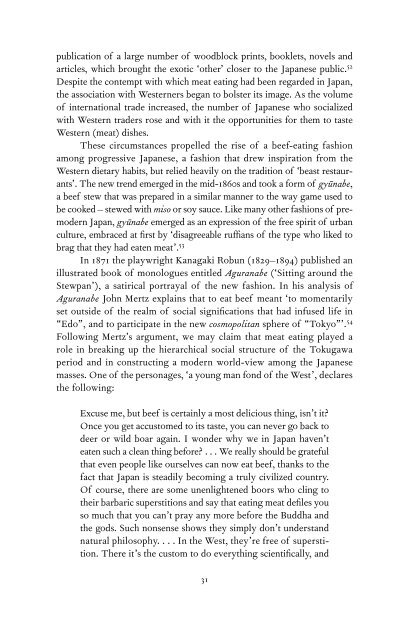Download - Brainshare Public Online Library
Download - Brainshare Public Online Library
Download - Brainshare Public Online Library
You also want an ePaper? Increase the reach of your titles
YUMPU automatically turns print PDFs into web optimized ePapers that Google loves.
publication of a large number of woodblock prints, booklets, novels and<br />
articles, which brought the exotic ‘other’ closer to the Japanese public. 52<br />
Despite the contempt with which meat eating had been regarded in Japan,<br />
the association with Westerners began to bolster its image. As the volume<br />
of international trade increased, the number of Japanese who socialized<br />
with Western traders rose and with it the opportunities for them to taste<br />
Western (meat) dishes.<br />
These circumstances propelled the rise of a beef-eating fashion<br />
among progressive Japanese, a fashion that drew inspiration from the<br />
Western dietary habits, but relied heavily on the tradition of ‘beast restaurants’.<br />
The new trend emerged in the mid-1860s and took a form of gyūnabe,<br />
a beef stew that was prepared in a similar manner to the way game used to<br />
be cooked – stewed with miso or soy sauce. Like many other fashions of premodern<br />
Japan, gyūnabe emerged as an expression of the free spirit of urban<br />
culture, embraced at first by ‘disagreeable ruffians of the type who liked to<br />
brag that they had eaten meat’. 53<br />
In 1871 the playwright Kanagaki Robun (1829–1894) published an<br />
illustrated book of monologues entitled Aguranabe (‘Sitting around the<br />
Stewpan’), a satirical portrayal of the new fashion. In his analysis of<br />
Aguranabe John Mertz explains that to eat beef meant ‘to momentarily<br />
set outside of the realm of social significations that had infused life in<br />
“Edo”, and to participate in the new cosmopolitan sphere of “Tokyo”’. 54<br />
Following Mertz’s argument, we may claim that meat eating played a<br />
role in breaking up the hierarchical social structure of the Tokugawa<br />
period and in constructing a modern world-view among the Japanese<br />
masses. One of the personages, ‘a young man fond of the West’, declares<br />
the following:<br />
Excuse me, but beef is certainly a most delicious thing, isn’t it?<br />
Once you get accustomed to its taste, you can never go back to<br />
deer or wild boar again. I wonder why we in Japan haven’t<br />
eaten such a clean thing before? . . . We really should be grateful<br />
that even people like ourselves can now eat beef, thanks to the<br />
fact that Japan is steadily becoming a truly civilized country.<br />
Of course, there are some unenlightened boors who cling to<br />
their barbaric superstitions and say that eating meat defiles you<br />
so much that you can’t pray any more before the Buddha and<br />
the gods. Such nonsense shows they simply don’t understand<br />
natural philosophy. . . . In the West, they’re free of superstition.<br />
There it’s the custom to do everything scientifically, and<br />
31







